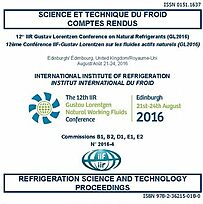
Document IIF
Analyse thermodynamique de différentes détentes à éjecteur dans des cycles transcritiques au R744 par temps chaud.
A thermodynamic analysis of various ejector expansions in R-744 trans-critical cycles at warm weather condition.
Numéro : pap. 1062
Auteurs : CHOUDHARY K. D., SUNDER S., DASGUPTA M. S.
Résumé
Refrigeration and air conditioning addresses fundamental human requirement in the fields like food conservation, health care and thermal comfort worldwide. Major research is currently focused towards improving the cycle efficiency of natural refrigerants as they have much lower GWP and ODP. Transcritical R-744 cycle is a promising refrigeration cycle using natural refrigerant. In this study, five different configurations of ejector expansion R-744 trans-critical cycle are identified from literature. Thermodynamic analysis of each are carried out using constant pressure mixing model assuming equivalent cooling load and warm weather operating condition. Performance parameters such as COP, entrainment ratio, pressure recovery and exergy destruction rate are compared for the various cycles by varying motive nozzle inlet condition and evaporator condition. Study clearly brings out relative merits of ejector expansion cycles in improving COP at warm weather operating condition.
Documents disponibles
Format PDF
Pages : 12 p.
Disponible
Prix public
20 €
Prix membre*
Gratuit
* meilleur tarif applicable selon le type d'adhésion (voir le détail des avantages des adhésions individuelles et collectives)
Détails
- Titre original : A thermodynamic analysis of various ejector expansions in R-744 trans-critical cycles at warm weather condition.
- Identifiant de la fiche : 30019145
- Langues : Anglais
- Source : 12th IIR Gustav Lorentzen Conference on Natural Refrigerants (GL2016). Proceedings. Édimbourg, United Kingdom, August 21st-24th 2016.
- Date d'édition : 21/08/2016
- DOI : http://dx.doi.org/10.18462/iir.gl.2016.1062
Liens
Voir d'autres communications du même compte rendu (140)
Voir le compte rendu de la conférence
Indexation
-
Numerical modeling of the off-design performanc...
- Auteurs : LAWRENCE N., ELBEL S.
- Date : 21/08/2016
- Langues : Anglais
- Source : 12th IIR Gustav Lorentzen Conference on Natural Refrigerants (GL2016). Proceedings. Édimbourg, United Kingdom, August 21st-24th 2016.
- Formats : PDF
Voir la fiche
-
Comparison and validation of one-dimensional mo...
- Auteurs : YOU C., MICHEL B., REVELLIN R.
- Date : 13/06/2022
- Langues : Anglais
- Source : 15th IIR-Gustav Lorentzen Conference on Natural Refrigerants (GL2022). Proceedings. Trondheim, Norway, June 13-15th 2022.
- Formats : PDF
Voir la fiche
-
Thermodynamic analysis of a CO2 transcritical r...
- Auteurs : PUROHIT N., GUPTA D. K., DASGUPTA M. S.
- Date : 21/08/2016
- Langues : Anglais
- Source : 12th IIR Gustav Lorentzen Conference on Natural Refrigerants (GL2016). Proceedings. Édimbourg, United Kingdom, August 21st-24th 2016.
- Formats : PDF
Voir la fiche
-
Experimental study on control methods for trans...
- Auteurs : LAWRENCE N., ELBEL S.
- Date : 21/08/2016
- Langues : Anglais
- Source : 12th IIR Gustav Lorentzen Conference on Natural Refrigerants (GL2016). Proceedings. Édimbourg, United Kingdom, August 21st-24th 2016.
- Formats : PDF
Voir la fiche
-
Experimental comparison of the performance of a...
- Auteurs : LAWRENCE N., ELBEL S.
- Date : 21/08/2016
- Langues : Anglais
- Source : 12th IIR Gustav Lorentzen Conference on Natural Refrigerants (GL2016). Proceedings. Édimbourg, United Kingdom, August 21st-24th 2016.
- Formats : PDF
Voir la fiche
